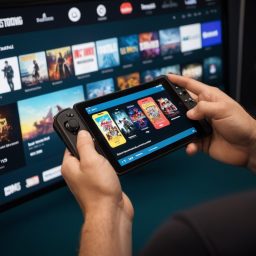Are We Really Owning Anything Anymore?
In recent years, the notion of ownership has shifted dramatically across various industries. From streaming services for movies and music to subscription models for software and even household goods, we’ve entered an era where access often trumps possession. One of the most striking examples of this shift is within the gaming industry, where digital formats and subscription services have become the norm. This transformation raises important questions about consumer rights and the long-term implications of a subscription-based economy.
The Shift to Digital in Gaming
The gaming industry has seen a significant evolution from physical cartridges and discs to digital downloads and streaming services. Companies like Sony, Microsoft, and Nintendo have increasingly pushed their digital storefronts, making it easier than ever to purchase and download games directly to a console or PC. Services like Xbox Game Pass, PlayStation Now, and NVIDIA GeForce Now offer vast libraries of games for a monthly fee, emphasizing access over ownership.
While this model provides undeniable convenience and value, it also means that gamers are more dependent on these companies than ever before. Games can be removed from libraries with little notice, digital rights management (DRM) can restrict access, and servers can be shut down, rendering purchased content inaccessible.
The Illusion of Ownership
In the past, buying a physical game meant owning a copy that could be played, shared, or resold. Today, purchasing a digital game often only grants a license to play it under specific conditions set by the provider. This shift has several implications:
- Control: Consumers have less control over their purchased content. Games can be modified or removed by the publisher at any time.
- Longevity: The lifespan of a digital game is tied to the publisher’s support. Once servers are shut down or the game is delisted, access can be permanently lost.
- Value: The resale market for games has diminished, as digital licenses typically cannot be transferred or sold.
The Cost of Losing Access
I personally experienced the drawbacks of this system when I was banned from Xbox Live. The circumstances leading to the ban were justified, and I won’t delve into those details, but the consequences were severe. I lost access to all the downloadable content (DLC) I had paid for on my original account. This situation forced me to abandon the account and start anew, losing not only the DLC but also my progress in numerous games. It was a stark reminder of how little control we truly have over digital purchases.
The Convenience Trap
Subscription services like Xbox Game Pass offer tremendous value, granting access to hundreds of games for a modest monthly fee. This model is appealing, especially for gamers who enjoy trying out multiple titles without committing to a full purchase. However, this convenience comes at a cost:
- Dependency: Gamers become dependent on the continued existence and policies of these services. If a game is removed from the service, players lose access unless they buy it separately.
- Data and Privacy: Subscription services often collect extensive data on user behavior, raising privacy concerns.
- Recurring Costs: The cumulative cost of multiple subscriptions can add up over time, sometimes exceeding what a consumer might have spent on purchasing games outright.
DRM and the Myth of Physical Ownership
Even owning a physical game disc doesn’t guarantee the sense of security it once did. Many modern games, even when purchased on disc, require large updates upon installation. These updates can be the size of the entire game on the disc, meaning the physical media is essentially just a key to access the digital content. DRM, while useful in combating piracy and ensuring developers get paid, often leaves legitimate consumers feeling vulnerable. If a game requires an online connection to verify ownership or download updates, it can become unplayable if the servers are taken offline.
The Broader Implications
The gaming industry’s shift to digital and subscription models is part of a broader trend affecting many aspects of our lives. Software as a Service (SaaS) models, subscription boxes, and streaming platforms all contribute to a culture where ownership is increasingly rare. This has significant implications:
- Economic: The recurring nature of subscriptions can strain budgets, especially as more services compete for consumer dollars.
- Environmental: While digital goods reduce physical waste, the infrastructure required for constant streaming and digital downloads has its environmental costs.
- Cultural: The concept of ownership is deeply embedded in many cultures. The move away from ownership can alter how we value and interact with goods and media.
Navigating the New Normal
As consumers, it’s crucial to be aware of the trade-offs involved in subscription-based models. Here are some strategies to navigate this landscape:
- Evaluate Needs: Consider which subscriptions provide real value and which can be cut.
- Stay Informed: Keep up with changes in terms of service and be aware of what you’re agreeing to when subscribing.
- Support Alternatives: Where possible, support platforms and publishers that offer fair terms and preserve consumer rights.
The shift to digital and subscription models in gaming and beyond is reshaping our relationship with the things we use and enjoy. While these models offer convenience and access, they also come with strings attached. As we navigate this new normal, it’s important to stay informed and make conscious choices about how we engage with subscription services. Only then can we ensure that we retain some control over the things that matter to us.

